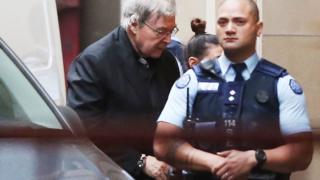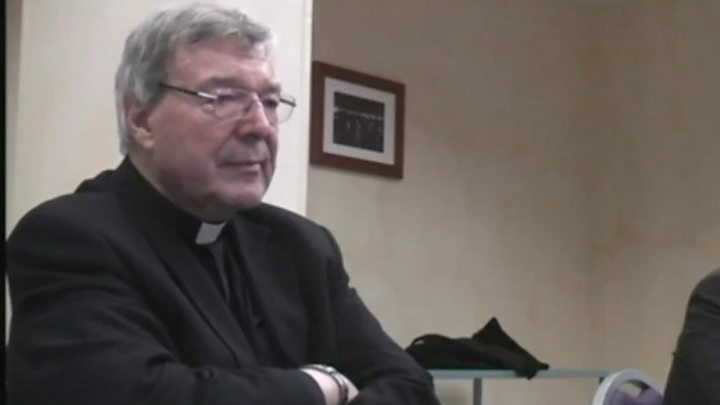 Image copyright
Image copyright
Getty Images
Cardinal George Pell is led into court on Thursday
Australian prosecutors are arguing that Cardinal George Pell’s conviction for child sexual abuse is “unimpeachable”, on the final day of his appeal hearing.
The ex-Vatican treasurer was found guilty by a jury last year of abusing two boys in 1996 in a Melbourne church. He was later jailed for six years.
Pell, 77, is the most senior Catholic figure to be convicted of such crimes.
But he maintains his innocence and is seeking to overturn the jury’s verdict, arguing it was “unreasonable”.
The Australian cardinal has been transported in a police van from prison to Victoria’s Court of Appeal for the hearing, which began on Wednesday.
Pell’s lawyers have detailed several arguments for why the abuse could not have occurred, but prosecutors have rejected those claims.
“When looking at the whole of the evidence, the integrity of the jury’s verdicts is unimpeachable,” they said in submissions to the appeal court.
Image copyright
Reuters
Pell wore a black suit and clerical collar to his appeal hearing
His conviction has rocked the Catholic Church, where he had been among Pope Francis’s closest advisers.
What was Pell convicted of?
Last year, the County Court of Victoria heard that Pell had abused two 13-year-old boys following a mass in 1996, when he was archbishop of Melbourne. He abused one of the boys again in 1997, the court was told.
A jury unanimously convicted him on one charge of sexually penetrating a child under 16, and four counts of committing an indecent act on a child under 16.
The trial heard testimony from one of the victims. The other died of a drug overdose in 2014.
Pell chose not to give evidence during the trial.
What’s happened so far in the appeal?
Pell has contested the verdict on three grounds. The first – and most debated – asserts that the jury was “unreasonable” in their verdict, because they relied too heavily on the testimony of the surviving victim.
Pell’s lawyer, Bret Walker SC, said that other witnesses’ evidence and an alleged timeline showed that it would be “literally, logically impossible for the offending to have occurred”.
The second aspect of the appeal asserts that the trial judge had wrongly prevented a defence animation from being played at the trial.

Media playback is unsupported on your device
The video represents the locations of witnesses inside St Patrick’s Cathedral. Pell’s lawyers argue that he could not have committed abuse because it was impossible for him to be alone.
The third challenge contends that Pell was prevented from entering his plea before a jury – against court process.
Prosecutors began rebutting each of those claims on Thursday.
They described the testimony of the surviving victim – who cannot be named – as “compelling”, adding that he was a “witness of truth”.
What could happen on Thursday?
The appeal is being heard by three judges in the Court of Appeal – a division of the Supreme Court of Victoria.
Image copyright
SUPREME COURT OF VICTORIA
The appeal is being considered by judges (from left) Chris Maxwell, Anne Ferguson and Mark Weinberg
The judges are also simultaneously deciding whether Pell can be granted leave to appeal at all – in other words, whether he is allowed to do so.
A successful appeal could result in a retrial or Pell being immediately released, legal experts say. That decision requires only two of the three judges to agree.
The judges could give their decision either immediately after hearings conclude on Thursday or reserve it for a later date.
Any decision could be challenged further in the High Court of Australia – the nation’s top court.
The Vatican has previously said that Pell has the right to “defend himself to the last degree”. Pell’s surviving victim has previously expressed concern that the verdict could be overturned.
“There is no rest for me. Everything is overshadowed by the forthcoming appeal,” he said in March.
Cardinal Pell verdict "unimpeachable" - prosecutors



0 Comments: